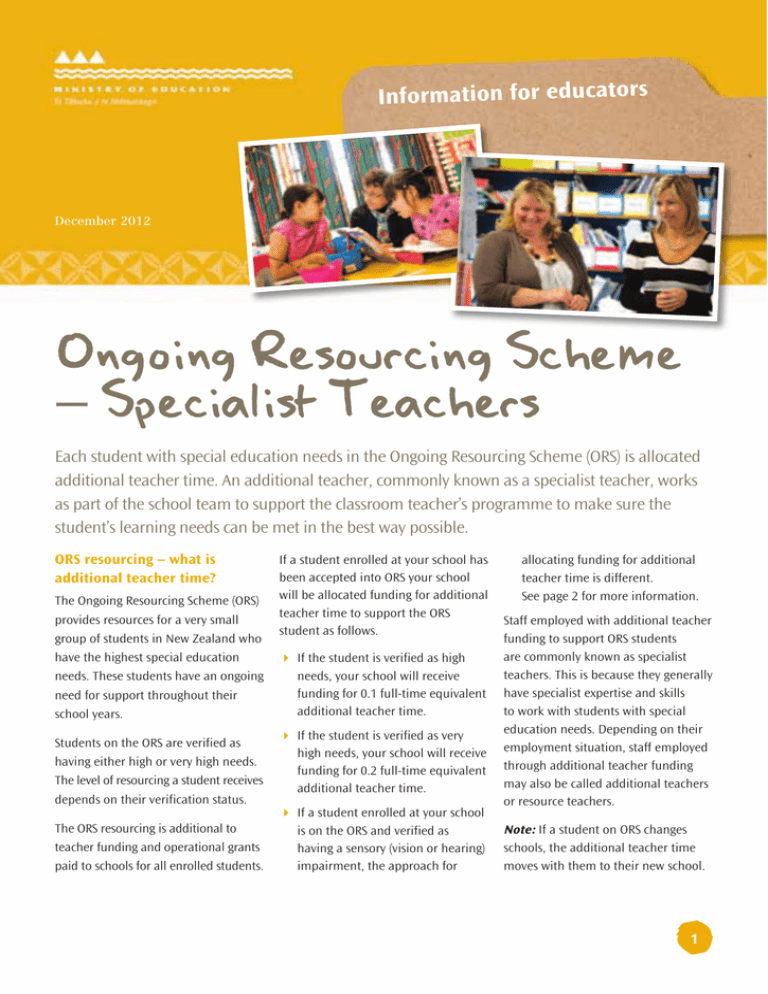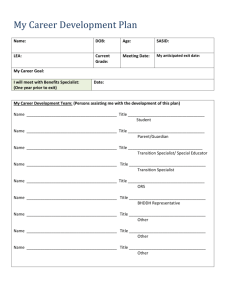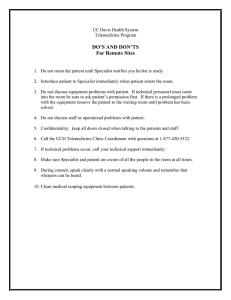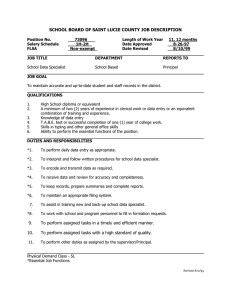
Information for educators
December 2012
Ongoing Resourcing Scheme
– Specialist Teachers
Each student with special education needs in the Ongoing Resourcing Scheme (ORS) is allocated
additional teacher time. An additional teacher, commonly known as a specialist teacher, works
as part of the school team to support the classroom teacher’s programme to make sure the
student’s learning needs can be met in the best way possible.
ORS resourcing – what is
additional teacher time?
The Ongoing Resourcing Scheme (ORS)
provides resources for a very small
group of students in New Zealand who
have the highest special education
needs. These students have an ongoing
need for support throughout their
school years.
Students on the ORS are verified as
having either high or very high needs.
The level of resourcing a student receives
depends on their verification status.
The ORS resourcing is additional to
teacher funding and operational grants
paid to schools for all enrolled students.
If a student enrolled at your school has
been accepted into ORS your school
will be allocated funding for additional
teacher time to support the ORS
student as follows.
If the student is verified as high
needs, your school will receive
funding for 0.1 full-time equivalent
additional teacher time.
If the student is verified as very
high needs, your school will receive
funding for 0.2 full-time equivalent
additional teacher time.
If a student enrolled at your school
is on the ORS and verified as
having a sensory (vision or hearing)
impairment, the approach for
allocating funding for additional
teacher time is different.
See page 2 for more information.
Staff employed with additional teacher
funding to support ORS students
are commonly known as specialist
teachers. This is because they generally
have specialist expertise and skills
to work with students with special
education needs. Depending on their
employment situation, staff employed
through additional teacher funding
may also be called additional teachers
or resource teachers.
Note: If a student on ORS changes
schools, the additional teacher time
moves with them to their new school.
1
What are the options when a
school is allocated additional
teacher time?
If a student enrolled at your school
is receiving additional teacher time,
there are two ways it can be used
depending on the student’s special
education needs.
1.Employ a specialist teacher
on school staff
The Ministry allocates funding for
additional teachers to schools.
Schools can employ specialist
teachers as a member of school
staff. As with all teachers, additional
teachers are responsible to the
principal and board of trustees.
2.Receive specialist teacher
support through the
Outreach Service
Schools enrolling students on the
ORS, who do not have a sensory
impairment, can agree to transfer
the additional teacher staffing
component to an Outreach Service
provider to receive support from
an Outreach specialist teacher.
For further information about
the Outreach Service refer to the
Specialist Teacher Outreach Service
– Information for Educators sheet.
Note: When the specialist teacher
is employed by another school,
as in the case of the sensory schools
(see below) or Outreach Service,
your school will need to complete
a memorandum of understanding
to identify and agree with the other
school how the specialist teacher
will work with the student and the
student’s support team.
2
Students on the ORS who
have a sensory impairment
There is a different approach for
allocating funding for additional
teacher time for students on the ORS
who also have a sensory impairment
(students who have been accepted
into ORS and are vision or hearing
impaired).
Specific knowledge is required
to support students on the ORS
who have a sensory impairment.
The Ministry allocates funding for
specialist teachers directly to the
Deaf Education Centres (Kelston
Deaf Education Centre or Van
Asch Deaf Education Centre) or
BLENNZ (Blind and Low Vision
Education Network, New Zealand).
These teachers are called Resource
Teachers: Deaf or Resource
Teachers: Vision.
Students on the ORS who have
a sensory impairment and other
special education needs
When a student on the ORS with a
sensory impairment also has other
special education needs and is
verified on other ORS criteria, the
Deaf Education Centre or BLENNZ
and the student’s school can discuss
how to best meet the student’s needs.
For example:
If a student is verified for
both a visual impairment and
other special education needs
and the enrolling school has
been allocated funding for an
additional teacher, the school
can agree to transfer the staffing
to BLENNZ if the student
needs support from a Resource
Teacher: Vision.
If a student is verified for both a
hearing impairment and other
special education needs and
the funding for an additional
teacher has been allocated to
the Deaf Education Centre, the
Deaf Education Centre may agree
to transfer the funding to the
enrolling school after discussing
the student’s broader needs.
If a student is verified for special
education needs other than
hearing, but the enrolling school
is also concerned about the
support the student requires
for a hearing impairment,
they can discuss this with the
Deaf Education Centre and
transfer the ORS funding to
it if appropriate.
Information for schools
employing specialist teachers
Your school can employ specialist
teachers to suit particular needs.
This may be done in a number of
different and flexible ways.
A school with several enrolled
students on the ORS may choose
to employ one specialist teacher
to work with one or more
students with similar needs, or
the school may employ several
different specialist teachers to
work with individual students
who have different special
education needs.
Some schools may choose to
combine the additional teacher
resources and share the specialist
teacher between schools.
Some schools may choose to
combine the additional teacher
funding to create a ‘homeroom’
or ‘learning centre’, with
dedicated staffing. This should
not compromise or exclude
individual students receiving ORS
support participating in other
classes with specialist teacher
support as appropriate.
It’s up to your school to determine
how additional teacher time will be
used. Your school will be expected
to clearly show how the use of
the additional teacher resource is
meeting the needs of the students
on the ORS.
Note: Additional teacher time
is not intended for the overall
administration of special education
services in schools, for counselling
or guidance, or for reducing overall
class size.
What skills should schools look
for when employing a specialist
teacher?
Specialist teachers should have the
skills and expertise to work with
students with special education
needs, or be prepared to undertake
professional development in
relevant special education topics
such as adapting teaching and
learning strategies within
The New Zealand Curriculum
and Te Marautanga o Aotearoa.
Schools should aim to employ
teachers in specialist teacher
positions who have qualifications
and experience relevant to the
needs of the students they will be
supporting.
Where there are no teachers with
relevant expertise in the local area,
schools should select the most
appropriate teacher and arrange for
professional support.
Postgraduate Diploma
in Specialist Teaching:
Complex Educational Needs
Massey University and the University
of Canterbury both offer a
Postgraduate Diploma in Specialist
Teaching: Complex Educational
Needs. The Ministry offers a Complex
Needs Study Award to support
teachers or advisors who work with
students with complex education
needs and would like to gain this
postgraduate qualification.
For more information about the
Complex Needs Study Award go to:
www.minedu.govt.nz/NZEducation/
EducationPolicies/SpecialEducation/
CareersAndProfessionalDevelopment/
SpecialEducationScholarshipsAnd
StudyAwards/2013/Categories/
ComplexNeeds.aspx
The role of the
specialist teacher
The classroom teacher is responsible
for ensuring every student in their
class learns and achieves. For some
parts of the school day a classroom
teacher may include a student on
the ORS with little or no change
to the classroom programme.
However, at other times significant
adaptations may need to be made
to the classroom programme to
meet the needs of the student.
The specialist teacher works with
the classroom teacher to adapt the
class environment, programmes
and materials.
Your school’s Special Education
Needs Coordinator (SENCo), or staff
member with responsibility for
special education, will also support
and work with the classroom
teacher and specialist teacher.
The timing, type and level of
support a specialist teacher provides
should be agreed between the
classroom teacher and the student’s
support team, so teaching and
learning is planned and delivered
in a coordinated way. The student’s
support team may include: the
classroom or subject teacher/s,
teacher’s aide, other school staff
such as the specialist teacher or
senior members of the school team
such as the SENCo or dean, other
specialist services and the student’s
family or whänau.
Like classroom teachers, specialist
teachers should also perform a
combination of activities – some
of their time will be spent in the
classroom and some of their time
will be spent planning, developing
resources and meeting with others to
support the student and their team.
Specialist teachers provide a range
of specialist teaching and support
activities to:
assess a student’s learning needs
plan and prepare appropriate
learning programmes for the
student
monitor student progress and
achievement and planning next
learning steps
model effective teaching
strategies and practices for
teachers and teachers’ aides
3
assist with differentiating class
and school curriculum content
within the The New Zealand
Curriculum and Te Maruatanga
o Aotearoa
adapt and prepare learning
materials and resources
appropriate for a student’s needs
teach students within the class
or small group settings
integrate specialist services/
therapy interventions into
everyday class and school
programmes
contribute to the Individual
Education Plan (IEP) planning
and implementation process.
Specialist teachers and
Individual Education
Plans (IEPs)
The IEP is a written plan that sets
out a student’s goals and identifies
teaching strategies, resources and
support needed from the people
around the student to help them
achieve those goals.
It’s the school’s responsibility to
initiate the IEP process and plan
for the student. An IEP is developed
as part of a collaborative process
between those who work with and
know the student well. The IEP team
process belongs to the support team
members and includes parents/
whänau and the student as active,
valued key members. All team
members are responsible for the
collaborative process that informs
and shapes the IEP.
At IEP meetings the team agrees
on a plan to inform teaching and
learning; it may also include wider
school and community goals.
Teachers are the leaders of learning
in their classrooms. Their role in the
IEP process is crucial to the student’s
learning programme and progress.
The specialist teacher is an essential
member of the student’s IEP team
and contributes their expertise as
part of the IEP process. For further
information about the IEP process
see the following publications.
Individual Education Plans
working as a team – Information
for parents/caregivers and
educators.
Collaboration for Success:
Individual Education
Plans booklet.
The IEP team decides the roles
and responsibilities for each
team member, depending on
the student’s learning context
and the experience and needs
of team members.
For more information:
If you’re unclear about any part of our service or have any questions about the help your student
receives, please talk with special education staff at your local Ministry of Education office or call the
special education information line on 0800 622 222.
You can get more detailed special education information under the educator section of our website:
www.minedu.govt.nz or on Te Kete Ipurangi, a website that provides educational material for teachers
and schools: www.tki.org.nz.
4
© Crown copyright 2013. All rights reserved.
We encourage you to share this information
with others. If you do so, please acknowledge
its source.




